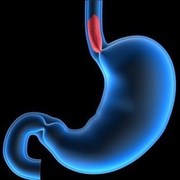Treatment
Treatment aims to decrease the number of episodes of heartburn and its complications. This focuses on:
- Stopping the flow of acid back into the esophagus
- Decreasing production of stomach acid
Treatment may include:
Lifestyle Changes
Lifestyle changes may include:
- Keep a food diary of what you eat and what the reaction is. Make gradual changes to your diet and record the results.
-
Avoid foods that may cause symptoms, such as:
- High-fat foods
- Fried foods
- Spicy foods
- Onions and garlic
- Chocolate
- Peppermint
- Citrus fruits
- Tomatoes
- Peppers
- Alcohol
- Coffee
- Carbonated drinks
- Eat smaller portions.
- Allow at least 2-3 hours between meals and lying down.
- Lose weight .
- If you smoke, quit .
- Avoid belts and clothing that are too tight. This may increase pressure on the abdomen.
- Elevate head of bed 6-8 inches.
Medication
Medications may include:
- Over-the-counter antacids —to neutralize stomach acid; works quickly, but can cause problems with long-term use (eg, Maalox Advanced Regular Strength, Tums, Rolaids, Mylanta
- Over-the-counter H2-blocker drugs—to stop the stomach from producing as much acid (eg, cimetidine, famotidine, ranitidine )
- Proton-pump inhibitors—to suppress acid production or reduce the chance of acid entering the esophagus (eg, omeprazole, lansoprazole)
- Medications that coat and protect the lining of the stomach (eg, sucralfate)
- Medications that improve muscle tone in the lower esophageal sphincter (eg, metoclopramide )
Procedures
If symptoms are severe and you can't tolerate the medications, surgery may be an option.
The most common surgery for heartburn is fundoplication . The doctor wraps the stomach around the esophagus. This creates pressure on the muscle at the opening to the stomach. If you have a hiatal hernia, it can also be repaired at this time.
In some cases, the surgery can be done with smaller incisions, called laparascopy .
Endoscopic Antireflux Procedures
An advantage of endoscopic techniques is that they do not involve incisions in the skin. Instead, the doctor inserts a lighted device called an endoscope through the mouth and down the esophagus to reach the first part of the stomach. Through the endoscope, the doctor can perform one of a variety of procedures that decreases the backward flow of stomach acid into the esophagus, including transoral incisionless fundoplication.
If surgery or endoscopy is successful, you may not need to take heartburn medications anymore. Talk to your doctor about the best treatment for you.
Please be aware that this information is provided to supplement the care provided by your physician. It is neither intended nor implied to be a substitute for professional medical advice. CALL YOUR HEALTHCARE PROVIDER IMMEDIATELY IF YOU THINK YOU MAY HAVE A MEDICAL EMERGENCY. Always seek the advice of your physician or other qualified health provider prior to starting any new treatment or with any questions you may have regarding a medical condition. Copyright © 2024 EBSCO Publishing All rights reserved.


 What’s Causing Your Heartburn?
What’s Causing Your Heartburn?







